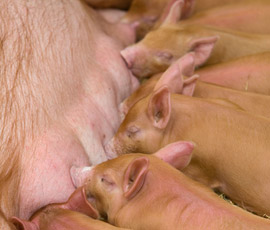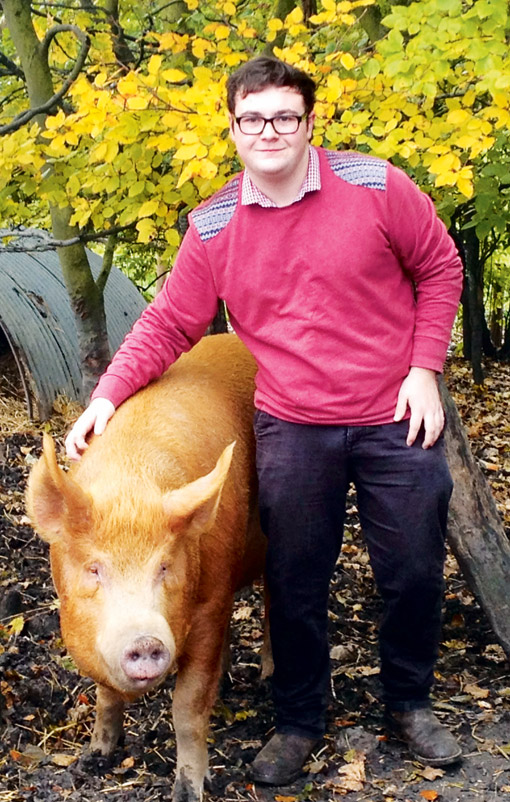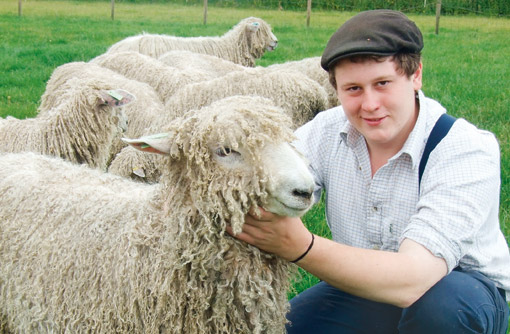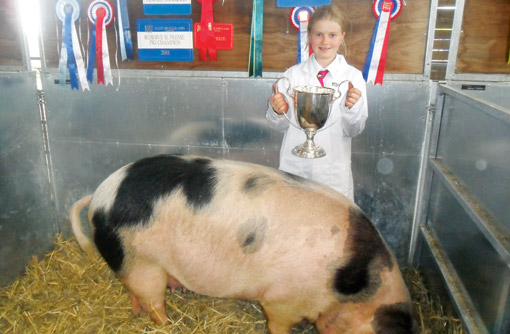Young advocates champion rare breeds

Preserving rare breeds is sometimes associated with the older generation – but that stereotype is fast becoming a thing of the past, thanks to the increasing number of youngsters championing these fascinating creatures.
It’s hard work and maybe not a typical teenage pastime, but their passion to preserve the bloodlines of such breeds and protect them from extinction is indisputable.
Rare Breed Survival Trust (RBST) managing director Rob Havard says such youngsters are playing a vital role in securing the future of native breeds.
“We’re not all old fogies,” he says. “I’m 34 and have kept rare breeds on our farm for 10 years.”
The RBST is a national charity working to ensure the security of cattle, sheep, chickens, goats and other animals deemed at risk. Its aim is to preserve them so they can be a vital genetic resource for future generations and to benefit agriculture.
“As well as an annual young shepherd competition, which attracted 40 finalists in two age categories, we also run a nine-month bursary scheme to get young people into conservation grazing, paying for them to learn the husbandry skills needed for this work,” adds Rob.
“We have also teamed up with Bicton College to run a series of courses related to keeping rare breed livestock, too.”
Ryan Perry 20

RBST conservation assistant Ryan Perry is keen to highlight you don’t need an agricultural background to make a difference to help protect native breeds from extinction.
Ryan, whose mother runs a dental practice while his father has a construction management business, began his fascination with livestock following visits to a city farm near his home in Gateshead, Tyne and Wear.
“From the age when I could walk, I was taken to Bill Quay Community Farm and from six or seven I started to be actively involved. I did general duties – my main interest is pigs and they had a herd of Saddlebacks and Tamworths,” he says.
“I was generally looking after the animals and, as I became older, and more aware of the rare breeds, I became more interested, mainly because of their attributes. They are a bit different to the commercial white pig – every single one has got a real character.”
After finishing his A-levels, Ryan was torn between the world of work and university, but given the economic climate chose the former, landing his dream job as conservation assistant for the RSBT.
As well as administration duties, he gives practical advice to new people coming into rare breeds. His other roles include developing breeding strategies, taking part in breed analysis and overseeing the running of the Young Shepherd of the Year Competition.
He is still involved in the city farm which first ignited his passion, where he now sits on the board of trustees and advises on livestock.
“Coming from a non-agricultural background I can really see the benefits of city farms – they do a lot of good work to educate people in towns and cities, but they have a serious lack of funding and a lot of them are potentially closing,” Ryan says.
“People may not think they are worthwhile saving, but I worked from when I was 16 to 19 at Bill Quay and did a lot of work with schools and it’s remarkable how many children do not know where meat comes from.”
Ryan, who is a previous winner of the Young Pig Handler of the Year title and also involved in the British Pig Association, is urging anyone with an interest in stock to get involved.
“Friends think I’m a bit bonkers. I was at a school in a town, had it been in the countryside it would have been slightly different, although they’ve always been supportive.”
With the right marketing, Ryan believes young farmers are capable of making very successful businesses from rare breeds, highlighting one case where a breeder has started to supply a top regional restaurant.
“In terms of rare breeds, young farmers who are looking to do something different can make it work if they market their product correctly.
“And a lot of younger people are coming into rare breeds – perhaps because of the cost, as there’s a low input and they can pay for themselves. It’s really important they do, as some of these breeds could be lost forever.”
James Chantry, 20

Lincolnshire lad James Chantry’s enthusiasm for farm animals began at a young age, when he would feed lambs on his dad’s smallholding.
The 20-year-old is championing the Lincoln Longwool, with ambitions to own the biggest flock in his home county and eventually the country.
James bought his first gimmer and set up Fieldside Flock, in Gainsborough, when he was 13, and became the country’s youngest breeder.
“We had commercial sheep when I was a younger, and thought we’d diversify into something a bit more specific,” he recalls. “I’m really proud to be from Lincolnshire, and I like anything that’s related to it – so the Longwool was the obvious choice.”
The Lincoln is the largest longwool sheep, developed over the centuries to produce heavy fleeces of strong wool to make hard-wearing cloth. The breed declined during the 20th century, and despite a partial revival in the 1980s remains in a precarious position.
Now with a flock of 50 pedigree sheep, agricultural engineer James says looking after them means he has two full-time jobs on his hands – with all the wages from the first eaten up by the second.
He sells his animals for breeding, never for meat, and mainly keeps them to take to livestock shows, where he has already picked up several pieces of silverware.
“I could never sell my sheep for meat; they’re like family – it would be like eating my brother,” James jokes. “People pay good money for them and I’m more interested in preserving the bloodlines for breeding.
“I’ve sold some of the fleeces too – they’ve fetched around £10 each. But I’m not in this for the profit – it’s never going to pay for itself. I’m doing it for the love of it.”
With his love of everything old-fashioned, James freely admits he was born in the wrong era. “I love everything that is old and traditional and these rare breeds are just that; they made Britain what it is.
“It’s sad that we’re losing them all the time, people are overlooking this and a lot of young people around aren’t bothered. It’s a crying shame.”
James is a devoted member of the Lincoln Longwool Sheep Breeders Association and was even known to load his charges up in his trailer and take them to school to mark Lincolnshire Day.
As well as designs on owning the biggest flock, James is also dedicated to getting other youngsters enthusiastic about preserving rare livestock.
“The young people that may be interested can sometimes be put off by the older faces, who don’t always want to talk to them, but I’m always happy to chat to people about this,” he says. “Keeping and breeding sheep is a fascinating hobby.”
Sarah Whitley, 16

Sarah Whitley may only be 16, but that hasn’t stopped her winning a string of awards for her rare breed pigs, as well as landing a television appearance offering advice on how to handle the beasts.
Growing up on a family farm spanning four generations, Sarah has always been surrounded by animals.
Birchfield Farm, near Harrogate, makes award-winning ice-cream thanks to its herd of Jersey cows, but is also home to a variety of sheep, chickens and rare breed pigs.
It was the addition of the Gloucestershire Old Spots a few years ago which really sparked Sarah’s interest in the preservation of the UK’s dwindling native animals.
“Our farm has always had animals. We started breeding the Old Spots in 2007 and it’s just gone from there,” says Sarah who is studying for her GCSEs.
“The whole family is involved, and then there’s more when the piglets come along. They are all reared and live outside in warm insulated arks. I help with the feeding, choosing show pigs and ear tattooing them.”
Sarah gets up early on show days to wash the animals before they go out in their breed classes. “I take the majority of the pigs out into the ring to show them but two people have to take the boars out,” she adds. “I do the registering to keep them pedigree too.
“They are really interesting animals – they’re good to watch and they have a really nice nature about them.”
The Gloucestershire Old Spot is a hardy breed able to cope with most conditions and is also known as an excellent forager. It has survived on low population numbers since the 1920s but is now becoming increasingly popular again due to its reputation for high quality meat production and this year marks the Breed Society’s centenary.
Although still young, Sarah, who hopes to pursue a career in agriculture, has already had a great deal of success in showing the family’s pigs and last summer was named Young Handler of the Year at the Hatfield Country Show.
In 2011, the teenager was also picked to offer some tips to Kirstie Allsopp for her Channel 4 show Handmade Britain. Sarah gave the presenter advice on how to show a pig and the skills involved in handling the animals, and under her tutelage Kirstie scooped a second in the ring at the Nidderdale Show.
Sarah’s home is in an Area of Outstanding Natural Beauty and she says that living in such a location means the majority of her peers understand and share her love of rural pursuits.
“Most of my friends live on farms and some of them have animals so they understand what it’s all about. It’s how they’ve always known me.
“It can be hard work looking after the animals, but it’s not that bad plus it’s very important that we preserve them as a breed and keep the bloodlines going.
“My aim is to breed pigs ideal for the breed standard, which I hope will be successful in the show ring. I have already chosen some pigs for this year’s shows.”
Keep up with the latest farming features and opinion on our Rural Living section
